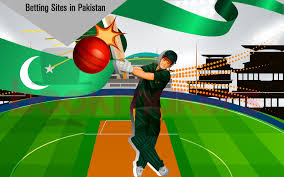
Cricket holds an almost sacred place in Pakistan’s national identity. From bustling street corners to luxurious stadiums, the sport is an integral part of the country’s social fabric, uniting millions of Pakistanis in their passion for the game. However, along with this obsession comes a darker undercurrent: the rise of gambling. Cricket betting has become increasingly popular, both legally and illegally, contributing to a growing gambling culture that has begun to intertwine with the sport. While the government and religious groups continue to oppose gambling, the lure of quick financial gain, particularly in connection with cricket, is driving more people to the illicit world of betting. This article explores the relationship between Pakistan’s love for cricket and the burgeoning gambling culture, examining the factors that fuel the phenomenon, the dangers it presents, and the potential for regulation.
Cricket: A National Passion and a Betting Playground
Cricket is more than just a sport in Pakistan—it’s a way of life. The country’s deep-rooted love for the game transcends age, class, and geography. From young children playing with tennis balls in narrow alleyways to ardent fans filling up the stands at the National Stadium in Karachi, cricket is a shared language for millions. The sport has produced some of the most legendary figures in international cricket, including Imran Khan, Wasim Akram, and Shahid Afridi, whose careers are woven into the national consciousness.
Given this intense passion for cricket, it’s no surprise that it has become a focal point for gambling. Cricket betting, often carried out through informal and underground channels, has been a part of the landscape for decades. From local bookmakers to online platforms, there are myriad ways for Pakistanis to place bets on their favorite teams, players, and match outcomes. The proliferation of online gambling websites has only accelerated this trend, providing easy access to betting markets without the risk of being caught by law enforcement.
With high-profile tournaments like the Pakistan Super League (PSL), International Cricket Council (ICC) events, and domestic matches drawing large crowds and generating substantial television viewership, betting on cricket has become an increasingly widespread activity. Betters place wagers on everything from match results to player performances, and with the potential for huge payouts, the appeal is undeniable. For many Pakistanis, gambling on cricket is seen as a form of entertainment, as well as a potential path to quick wealth.
The Influence of the Underground Gambling Economy
While the government has made efforts to curb illegal gambling, particularly in cricket, the underground economy continues to thrive. Pakistan’s strict anti-gambling laws, codified under the Prevention of Gambling Act, 1977, criminalize all forms of gambling, including betting on sports. However, enforcement is weak, and illegal gambling rings operate in plain sight, often under the guise of cricket-related entertainment. Bookmakers, both local and online, operate without fear of prosecution, profiting from a highly lucrative market that is fueled by the masses’ desire to capitalize on their cricket knowledge.
Online platforms have made gambling more accessible than ever before. The rise of smartphone apps and websites that offer cricket betting has drawn millions of young Pakistanis into the world of online gambling. These platforms operate from jurisdictions where gambling is legal, making them harder to shut down or regulate. As a result, Pakistan’s regulatory authorities are often powerless to curb the flow of money into these international gambling markets.
The underground nature of cricket betting in Pakistan has led to the creation of clandestine networks that involve everything from street-level bookies to large-scale international syndicates. Match-fixing and spot-fixing scandals, which have plagued the sport both domestically and internationally, are often driven by the pressures of illegal betting. Players, coaches, and even officials can become involved in fixing matches to ensure that betting outcomes align with the money being wagered. These scandals not only tarnish the sport’s credibility but also contribute to the corruption that thrives in Pakistan’s gambling underworld.
The Social and Economic Risks of Cricket Gambling
While betting on cricket may seem like harmless fun to many, the consequences of gambling—especially when it becomes compulsive—can be devastating. Gambling addiction in Pakistan is a growing problem, with individuals and families suffering financial ruin as a result of chronic betting. Many young people, especially those who have grown up with cricket as a central part of their lives, become lured into betting as a way to gain financial independence or secure their futures. The combination of passion for cricket and the opportunity for quick financial gain creates a dangerous cocktail for vulnerable individuals.
The social ramifications of gambling addiction are severe. Families can be torn apart when individuals fall deep into debt due to their betting habits. The economic strain caused by gambling addiction is often compounded by mental health issues, such as depression and anxiety, which can arise as individuals struggle to cope with their losses. The stigma surrounding gambling addiction in Pakistan, particularly in a society where it is viewed as a moral vice, often prevents people from seeking help. Without adequate mental health support systems or addiction services, the cycle of addiction and despair continues unabated.
On a broader scale, gambling also exacerbates the wealth gap in Pakistan. While some individuals may win big, the majority of bettors lose their money, further entrenching poverty and economic inequality. For low-income individuals, the temptation of betting on cricket as a shortcut to financial success can be particularly alluring, but the outcome is almost always detrimental.
The Role of Media and the Normalization of Gambling
Media plays a significant role in the growing gambling culture in Pakistan. Cricket broadcasts, especially those involving major events like the PSL or ICC World Cup, often serve as prime opportunities for betting advertisements and discussions surrounding the odds and outcomes of matches. While gambling advertising is technically illegal, online platforms and social media are rife with betting promotions, often targeting younger audiences who are more likely to engage with these ads.
Additionally, media coverage of high-profile match-fixing cases or betting scandals, though intended to highlight the dangers of gambling, can inadvertently normalize the practice. When prominent cricketers or officials are involved in betting-related scandals, it brings attention to the fact that gambling is prevalent even at the highest levels of the sport. This can lead to the perception that gambling is an inevitable or acceptable part of cricket culture, further enticing fans to get involved.
On the other hand, some media outlets in Pakistan have attempted to raise awareness about the dangers of gambling addiction, especially as it pertains to cricket. Public service campaigns and coverage of gambling’s negative impacts could help educate people about the risks and provide guidance on how to avoid or cope with addiction. However, given the prevalence of betting-related content in the media, there is an ongoing tension between sensationalizing the issue and promoting responsible behavior.
A Call for Regulation and Responsible Gambling Practices
The growing relationship between cricket and gambling in Pakistan has sparked calls for a more structured and regulated approach to the issue. Some experts argue that regulating cricket betting—similar to other countries with legalized gambling markets—could help reduce the influence of illegal gambling syndicates, while also providing much-needed revenue for the government through taxes. A regulated environment could also ensure that responsible gambling practices are promoted, with safeguards in place to protect vulnerable individuals.
However, this idea faces significant opposition, particularly from religious groups and conservative political factions, who see gambling as inherently immoral. There is a real fear that legalizing gambling, even in the context of cricket, would lead to social decay and undermine Pakistan’s Islamic values. Therefore, any movement toward gambling legalization or regulation would need to carefully navigate the cultural and religious sensitivities that shape public opinion.
At the same time, improving enforcement of existing gambling laws, expanding addiction treatment services, and raising public awareness about the risks of gambling could help mitigate some of the social harms associated with cricket betting. Pakistan could benefit from more robust mental health support systems for those struggling with gambling addiction, as well as educational campaigns that highlight the dangers of excessive betting.
Conclusion: A Complex Relationship
The obsession with cricket in Pakistan is undeniable, and so too is the growing culture of gambling that surrounds it. Cricket betting, whether illegal or online, has become a pervasive part of the sports landscape, drawing in millions of Pakistanis who seek the thrill of betting on their favorite game. While gambling remains a moral and legal taboo, its widespread prevalence highlights the complexities of regulating an activity that has deep cultural and economic ties to one of the country’s most beloved pastimes.
To effectively address the growing gambling culture tied to cricket, Pakistan must balance its rich cricketing heritage with a clear-eyed approach to the social and economic risks of gambling. Whether through stronger regulation, better enforcement, or public education campaigns, the country must recognize that cricket betting is no longer just a fleeting trend—it is a major aspect of Pakistan’s gambling landscape that warrants serious attention and action.
Experience Thrills and Big Rewards at KKClub Casino – Pakistan’s Premier Gaming Hub!

